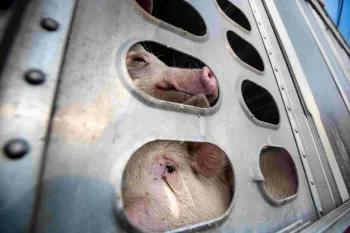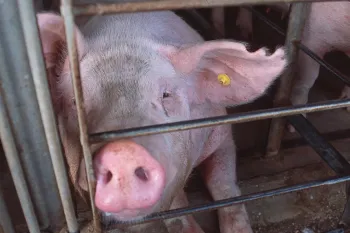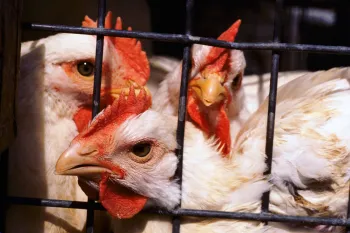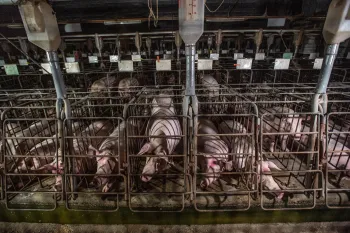We are finally seeing some breakthrough changes in how society views farm animals and, therefore, how they are treated. Right now, in the U.S., we're in a pitched battle to defend Proposition 12 and similar legislation to protect animals raised for food from proposed undermining language in the Farm Bill, a legislative package the U.S. Congress passes every few years to govern agricultural and food programs. With so much progress for farm animals hanging in the balance, it was great to see our colleagues in Great Britain rejoice last week when the UK Parliament finally banned the live export of farmed animals for fattening and slaughter.
For more than a century, farm animals have been subjected to long and grueling sea voyages, and animal advocates have been campaigning against this practice for more than 50 years. Transport-related suffering occasionally makes the news when a vessel holding thousands of animals becomes stranded at sea. These hellish journeys, known as “live export” and which also now occur by air and road, can last for days. During this time, animals suffer from fear and exhaustion, and they routinely sustain injuries. Once they reach their destinations, they are slaughtered.
This landmark legislation means that cows, sheep, goats, pigs and horses from Britain will no longer have to endure these terrible voyages. We pay enormous tribute to our friends at Compassion in World Farming and the RSPCA who have led the charge against live exports since the 1970s, and to the countless activists and campaigners who have staged protests, signed and shared petitions, and contacted the government. We are proud of the role Humane Society International/UK’s office and dedicated supporters have played in holding their government accountable on its commitment to a ban. (Due to trade agreements made after Brexit, Parliament did not include Northern Ireland in the legislation.)
Stopping animal cruelty so deeply entrenched in common practices takes both stamina and courage. The fight against live exports started in 1890 when British MP Samuel Plimsoll petitioned Parliament for an end to the overcrowded and deplorable conditions in the transatlantic live cattle trade, in which animals were often fatally injured and even thrown overboard during violent storms. While that trade ended around World War I, Britain’s live animal export trade to Europe and the Middle East grew rapidly from the 1960s, peaking in the early 1990s, when one million animals were exported annually. The majority were calves sent as “by-products” from the British dairy industry, to be fattened and killed for veal in continental Europe.
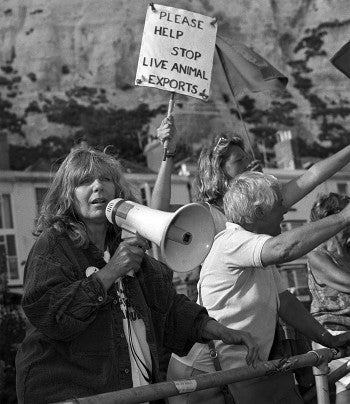
John Standing/Alamy Stock Photo
An outbreak of bovine spongiform encephalopathy, widely known as “mad cow disease,” in 1996 prompted an export ban on British cattle, which was lifted in 2006. Even though exports resumed, they declined in response to both lobbying campaigns in Westminster and protest blockades at ports and airports. Across the country, community protest groups formed in response to the shipments of live animals they saw passing by their homes. Ferry companies bowed to pressure from their customers and stopped exporting animals, and by 2012 there was just one British port shipping calves and sheep off to endure misery for the last days of their lives.
Live exports from Great Britain have been on pause since 2020, waiting for the establishment of infrastructure for conducting post-Brexit animal health checks once animals reach the EU. But without a legislative ban, there was nothing to stop live exports from returning, and there was no legal framework to recognize the wrongs of live export as a practice.
We have also seen progress in the movement against live export outside the UK. Our team in South Africa is fighting to end live exports in that country. Last year a Brazilian court banned live exports of cattle, which cannot be implemented soon enough; only last month a ship transporting cattle from Brazil for slaughter in Iraq docked in Cape Town. The fetid stench issuing from the vessel sparked an investigation. Our team, inspectors, the media and the public were shocked at the appalling conditions they discovered on board. Just halfway through the journey, many animals had to be euthanized because they were in such poor condition. Our team will challenge the South African government’s continued authorization of live exports, work that is becoming even more critical as other countries ban the trade and shipping companies look to countries with major ports, such as South Africa, to maintain it.
Earlier this month, Australia announced a plan to phase out live sheep exports by sea by May 2028. This is a seismic win: Over the last 60 years, Australia has sent more than 170 million sheep overseas, with average journey times of 10 days and 9% of journeys taking longer than three weeks. Humane Society International Australia joined forces with other animal welfare organizations including Animals Australia and RSPCA Australia to secure this ban by lobbying the government, submitting to parliamentary inquiries and mobilizing public support. We are proud of and heartened by their work. Victories like this show that, when people work together and refuse to give up on the compassionate world so many of us envision, change is possible. And on this important worldwide front against animal cruelty, we’re seeing tremendous change for the better.
Follow Kitty Block @HSUSKittyBlock.
